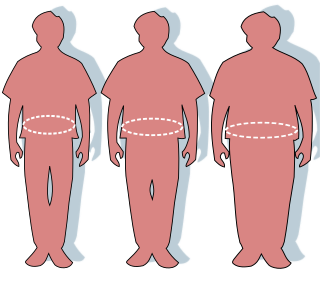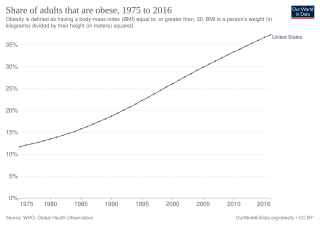Related Research Articles
Dieting is the practice of eating food in a regulated way to decrease, maintain, or increase body weight, or to prevent and treat diseases such as diabetes and obesity. As weight loss depends on calorie intake, different kinds of calorie-reduced diets, such as those emphasising particular macronutrients, have been shown to be no more effective than one another. As weight regain is common, diet success is best predicted by long-term adherence. Regardless, the outcome of a diet can vary widely depending on the individual.

Obesity is a medical condition, sometimes considered a disease, in which excess body fat has accumulated to such an extent that it can potentially have negative effects on health. People are classified as obese when their body mass index (BMI)—a person's mass divided by the square of the person's height—is over 30 kg/m2; the range 25–30 kg/m2 is defined as overweight. Some East Asian countries use lower values to calculate obesity. Obesity is a major cause of disability and is correlated with various diseases and conditions, particularly cardiovascular diseases, type 2 diabetes, obstructive sleep apnea, certain types of cancer, and osteoarthritis.
The National Physical Fitness Award (NAPFA) is a standard physical fitness test for Singaporeans as part of Singapore's Sports For Life programme. NAPFA was launched in January 1982 as a standardised assessment of overall fitness for the general population.

Sociology of the body is a branch of sociology studying the representations and social uses of the human body in modern societies.
Wellspring Academies was a pair of therapeutic boarding schools for overweight and obese children, teens, and young adults, both operated by Wellspring, a division of Aspen Education Group. It is said to be the first weight loss boarding school in the United States.

Childhood obesity is a condition where excess body fat negatively affects a child's health or well-being. As methods to determine body fat directly are difficult, the diagnosis of obesity is often based on BMI. Due to the rising prevalence of obesity in children and its many adverse health effects it is being recognized as a serious public health concern. The term overweight rather than obese is often used when discussing childhood obesity, as it is less stigmatizing, although the term overweight can also refer to a different BMI category. The prevalence of childhood obesity is known to differ by sex and gender.

The sociology of food is the study of food as it relates to the history, progression, and future development of society, encompassing its production, preparation, consumption, and distribution, its medical, ritual, spiritual, ethical and cultural applications, and related environmental and labor issues.

Obesity is common in the United States and is a major health issue associated with numerous diseases, specifically an increased risk of certain types of cancer, coronary artery disease, type 2 diabetes, stroke, and cardiovascular disease, as well as significant increases in early mortality and economic costs.

Being overweight is having more body fat than is optimally healthy. Being overweight is especially common where food supplies are plentiful and lifestyles are sedentary.

Obesity in the United Kingdom is a significant contemporary health concern, with authorities stating that it is one of the leading preventable causes of death. In February 2016, former Health Secretary Jeremy Hunt described rising rates of childhood obesity as a "national emergency". The National Childhood Measurement Programme, which measures obesity prevalence among school-age pupils in reception class and year 6, found obesity levels rocketed in both years groups by more than 4 percentage points between 2019–20 and 2020–21, the highest rise since the programme began. Among reception-aged children, those aged four and five, the rates of obesity rose from 9.9% in 2019–20 to 14.4% in 2020–21. By the time they are aged 10 or 11, more than a quarter are obese. In just 12 months, the rate is up from 21% in 2019–20 to 25.5% in 2020–21.

Obesity in China is a major health concern according to the WHO, with overall rates of obesity between 5% and 6% for the country, but greater than 20% in some cities where fast food is popular.

Weight management comprises behaviors, techniques, and physiological processes that contribute to a person's ability to attain and maintain a healthy weight. Most weight management techniques encompass long-term lifestyle strategies that promote healthy eating and daily physical activity. Weight management generally includes tracking weight over time and identifying an individual's ideal body weight.

Let's Move! was a public health campaign in the United States led by former First Lady Michelle Obama. The campaign aimed to reduce childhood obesity and encourage a healthy lifestyle in children.

Obesity in the Middle East and North Africa is a notable health issue. Out of the 15 fattest nations in the world as of 2014, according to the World Health Organization (WHO), five were located in the Middle East and North Africa region.
Social stigma of obesity is bias or discriminatory behaviors targeted at overweight and obese individuals because of their weight and high body fat percentage. Such social stigmas can span one's entire life as long as excess weight is present, starting from a young age and lasting into adulthood. Studies also indicate overweight and obese individuals experience higher levels of stigma compared to other people. Stigmatization of obesity is usually associated with increased health risks (morbidity) of being overweight or obese and the possibility of a shorter lifespan (mortality).

Criticism of fast food includes claims of negative health effects, animal cruelty, cases of worker exploitation, children-targeted marketing and claims of cultural degradation via shifts in people's eating patterns away from traditional foods. Fast food chains have come under fire from consumer groups, such as the Center for Science in the Public Interest, a longtime fast food critic over issues such as caloric content, trans fats and portion sizes. Social scientists have highlighted how the prominence of fast food narratives in popular urban legends suggests that modern consumers have an ambivalent relationship with fast food, particularly in relation to children.

Obesity and the environment aims to look at the different environmental factors that researchers worldwide have determined cause and perpetuate obesity. Obesity is a condition in which a person's weight is higher than what is considered healthy for their height, and is the leading cause of preventable death worldwide. Obesity can result from several factors such as poor nutritional choices, overeating, genetics, culture, and metabolism. Many diseases and health complications are associated with obesity. Worldwide, the rates of obesity have nearly tripled since 1975, leading health professionals to label the condition as a modern epidemic in most parts of the world. Current worldwide population estimates of obese adults are near 13%; overweight adults total approximately 39%.

Obesity is defined as the excessive accumulation of fat and is predominantly caused when there is an energy imbalance between calorie consumption and calorie expenditure. Childhood obesity is becoming an increasing concern worldwide, and Australia alone recognizes that 1 in 4 children are either overweight or obese.

Obesity in Thailand has been flagged as a major source of health concern, with 32% of the population identifying as overweight and 9% obese. With reference to 2016 data from the World Health Organization (WHO), Thailand has one of the highest incidence of overweight citizens in the South East Asian region, second to only Malaysia. The Thai National Health Examination Surveys (NHES) found that obesity in Thailand more than doubled during the period 1991-2014. This spike in obesity levels has been largely attributed to increased access to junk food, and unhealthy switches from active to sedentary lifestyles. These factors are closely linked to economic growth in the country.
Diet culture refers to a common set of trends and norms that may specifically affect those undertaking dieting or monitoring their caloric or nutritional intake. It often describes a set of societal beliefs pertaining to food and body image, primarily focused on losing weight, an endorsement of thinness as a high moral standard, and the alteration of food consumption. Scholars and activists believe that diet culture is often intertwined with racism and other forms of prejudice, and rely on an intersectional approach to discuss the interactions of prejudice based on gender, race, and weight. As a term, "diet culture" is used as a framework for social analysis and as a critique of contemporary social standards and their impact on body images and health as it pertains to those classified as overweight and engaged in a diet regimen.
References
- 1 2 3 Singapore schools' weight-loss programme linked to eating disorders: study, Agence France-Presse, 24 May 2005
- 1 2 3 Obesity series part III: Singapore Archived 25 July 2011 at the Wayback Machine , The World (radio program), 14 November 2007
- ↑ Singapore Shapes Up, Bryan Walsh, Time Asia, 1 November 2004
- 1 2 3 4 Schools making fat students thin, but emotional burden is heavy, Agence France Presse, 22 February 2005
- ↑ Fighting fat: with TAF in Singapore Archived 24 January 2013 at the Wayback Machine , Warren Lee, Diabetes Voice (International Diabetes Federation), May 2003
- 1 2 Singapore to Scrap Anti-Obesity Program, The Associated Press, 20 March 2007
- 1 2 3 "HuHF, it's not TAF to get fit". www.asiaone.com. Retrieved 12 October 2021.
- ↑ Hell-bent on looking thin Archived 21 May 2011 at the Wayback Machine , Ng Cheng Yee, The Star (Malaysia), 24 July 2007
- ↑ TAF students not at higher risk of anorexia Archived 18 February 2008 at the Wayback Machine , Ho Peng, Ministry of Education, Singapore, 20 May 2005
- ↑ Childhood obesity's about good choices, Melinda Tankard Reist, The Sydney Morning Herald, 12 April 2007